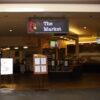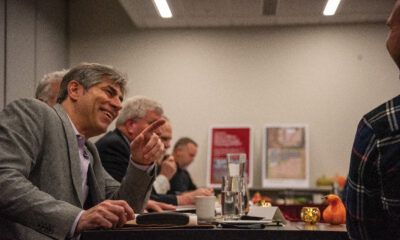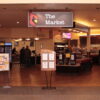The Panhandle Autism Society (PAS) hosted Temple Grandin at Schuler Performing Arts Center Friday night to learn about living and thriving with those who have autism.
According to the PAS website, they are a chapter of the Autism Society of America. Their focus includes providing information and referral for newly diagnosed people and their families, Providing support to families, and Providing training opportunities for families and professionals among others.
Grandin, who autism herself, advocates for others with varying neurodevelopmental conditions. She is known for her work in different humane ways to treat animals as well as the many books she’s written on autism and other topics.
The presentation, which drew in more than 1,000 people, was focused primarily on how to better accommodate those with autism to give the chance at growth and prosperity.
Every November PAS hosts an educational training event covering a range of topics. Grandin hosted this year’s educational seminar speaking on topics including sensory thought processes, ‘finding a backdoor’ for work, techniques for teaching practices, and developing strengths in individuals on the autism spectrum.
A highlighted section of the presentation was for techniques for identifying what type of learner a specific individual is and what activities or tasks coincide with their abilities. Her suggestion was to take something interesting to those with autism and develop it into a goal.
“Figure out what you’re good at and do it,” she said to the crowd.
“There’s a lot of information to take in, but definitely overall understanding how [my daughter] processes things and not being too judgemental in that. Learning to engage with her at her level,” Titus Nease said after the show.
A lot of parents here have done their research and are hoping to propel their children onward towards success. Many of the attendants are on the spectrum themselves and expressed excitement about hearing Grandin’s presentation.
“I think she’s really awesome. I liked how she’s very blunt. It’s very hard to find people who will tell you straight how things should be,” attendee Elizabeth Dillon said.
Some expressed their gratitude for Grandin’s varying suggestions for supporting those with autism.
“On a lot of levels, she is somebody that has made a name for herself in an industry in the 1970s when it was primarily men,” President of the Panhandle Autism Society Jennifer Cork stated. “That’s a huge accomplishment and just having her be someone that does have a disability that was able to accomplish great things, get her Ph.D. and become an advocate for others just lets people know that a disability diagnosis doesn’t mean that you aren’t going to be able to achieve your dreams.”
PAS hosts the annual Walk for Autism Awareness to raise money for grants that go towards needs not covered by Medicaid such as sensory equipment. They have raised over $40,000 over the past six years for individual families supporting an autistic person.
They lead support groups for socialization and therapy of individuals from all age ranges. They even have a support group for parents of children who are on the spectrum. One big initiative of PAS right now is training police departments and officers on how to understand and respond to them with care.
“I think the biggest initiative that PAS has done for our community in the last two years is they are doing disability in law enforcement training,” Melaine Collins, a past PAS board member said. “Where officer Gus Wessel, who is now on the board, and Jennifer Cork the new President are going and training all the police officers throughout north Idaho on how to deal with individuals with a developmental disability. The second part of that is they’re training the young adults and teenagers with disabilities as well and how they need to interact with the police.”
For more information about PAS, contact info@panhandleautismsociety.org.












